I had cameras like this till now : (Translated into English by realenglish4you)
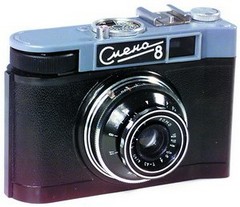
Szmena 8 ( short film camera)
My first photography apparatus. I may have bought it soon after I started to make money, i.e. at around the age of 17. However, the truth is that I had already had another one before, which used a 6x6 cm film, but I don't remember the type of it. At that time paper copies were made from the negative film. We lay down simply the negative onto the photopaper, we illuminated it, then put into the developing liquid, that was all. To be able to use this machine (Szmena), I had to learn a new concept: photograph magnification. The negative frame of this was only 24 by 36 mm. It was necessary to magnify it for the paper picture.
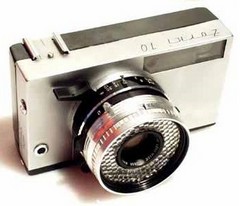
Zorki 10 ( short film camera)
Half - automatic apparatus, I was not fond of it, I got rid of it soon, and I bought a second-hand apparatus instead. I found it annoying that I never knew what the machine set. What's more, the values set automatically worked only if there was a certain minimum of light . In addition to it, ' B ' lock time was not available either...
Back to the Main Page
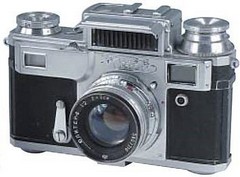
Kiev 4 ( short film camera)
This apparatus was meant for me at last. There were several setting options, and what I liked very much about it : there was a light meter on it. Although it was not fully trustworthy , I knew my way round it after using up one roll. I was able to change objective lenses but I did not have any, naturally. I took it with me everywhere, even into the Soviet Union. There I did not have a colour film with me. (The one I had ran out soon) I roamed the city until I found one. By this time our sight seeing tour was over, I missed everything. So I jumped into a taxi (one and a half hours did not cost 1 rouble, which was appr. 27 HUF and the taxi driver did not want to accept the tip! ) and we visited those places that I had already seen on our group excursion. Lomonosov University, Red Place etc. Little as my Russian language knowledge was, I could get by quite well.
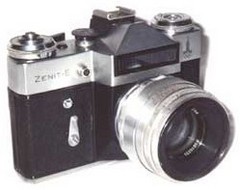
Zenit-E ( short film camera)
This one was the machine that I had deserved well indeed. Interchangeable objective lens, light meter, mirror-reflex, etc. I bought everything which was available for it. I purchased some macro lenses, I had a focal length multiplier constructed, and to this I had a 135 telephoto lens already. I improved my photo lab too. I believed I had everything. At this time the usage of colourfilm started to become common. The developed photo was not so expensive anymore and the quality was far better than before. That did me in. Up until then I had been developing my pictures, the photographic film, but the colourfilm technique was so complicated and expensive that I could not be prepared for that anymore. Here came a several - year break in my passion for taking photos. I used up a roll of film per year at most.
Back to the Main Page
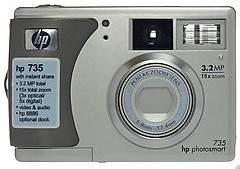
Hp 735 (digital 3.3 Mega pixel camera)
This long break ended when I managed to buy my first digital camera thanks to Sulinet programme. Looking back to it now, it had a small number of pixels, but then 4Mp was the largest, and a machine like that was not even in supply as it was way too expensive . It was possible to make a video recording on this one already. Unfortunately, the life of this device came to a very sad end. My daughter left it on a sandy beach one day, and as a consequence sand got in the body thus making it impossible to be repaired. However, we (and she !) took loads of valuable pictures with it before.
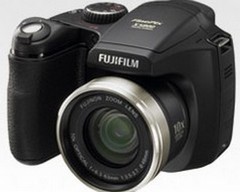
Fuji S5600 (digital 5.1 Mega pixel camera)
The price of the digital cameras became affordable even for me by that time, as it turned into a mass product. I considered the apparatus as the top of all, but it is not.There are some deficiencies , however, the 5 mega pixels make up for them a bit. On the other hand the video recording, which it makes, is surprisingly good. 640x480, 30 frame /sec. I took it with me for our Western Europe... I am still using it, the longest shutter time here was 15 seconds.
Back to the Main Page
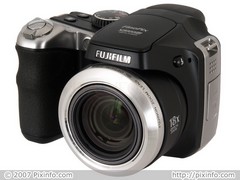
Fuji S8000fd (digital 8.2 Mega pixel camera)
The designers have ruined some things here, e.g. the longest lock time on this apparatus is only 4 sec, which is way too short for night photographs or tricky pictures. There is not "B" lock time. In an automatic position the ISO value cannot be influenced.(sensitivity) Apart from its zoom lens there is not much to envy about it. It is all made of fragile plastic. Although it is undoubtedly very practical that the macro (some cm) and its telephoto (several hundred metres) are available without having to exchange an objective lens. All in all I am not satisfied with it. I do not recommend that anybody should purchase it! It broke down several times during the first year of purchase. After getting it back from the service, it ended up in the same place 2 months later... I got it back again, now they denied that there had been anything wrong with it in the first place. The two Fuji cameras were under repair five times altogether within their first two years.

Nikon Coolpix P510 (digital
16.8 Mega pixel camera)
This
is the latest and so far, the best of my cameras. . Its 1000mm
equivalent focal length as well as its 42x zoom optical lens is
quite impressive. There is no "B " shutter speed. Both
macro photography (1 cm
) and
telephoto options (several
kilometers' distance)
are
available without having to change lenses. The diaphragm and
the shutter speed can be preset. Every setting can be done
manually. It can record a video in full HD(1920x
1080). To make it
possible, I have bought a 32 GB memory card for it. From now on
I am only going to record videos with this. It has opened up a
whole new world for me technically. I am keen to take
it with me everywhere. I am really satisfied with it so far.
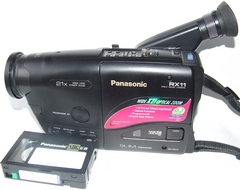
Panasonic NV RX-11 ( analogue video camera)
I borrowed a camcorder from one of my friends earlier, but after I bought this, the motion picture recording problem was resolved. It uses a mini VHS film, of which the longest one is only 1 hour. I recorded my younger daughter's wedding with this one, but mainly my son's mathematics competition awards ceremonies, because he was always present at them. Unfortunately the batteries weakened shortly after the warranty time was over. I am still using it, I recorded my practice game of Billiards with this. Naturally it is necessary to digitalise the video material, but the method of this.